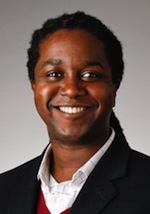Religious denominations friendly to same-sex marriage may protect gay youth from depression
Religious affiliation is generally a source of support, fostering resilience during difficult times. But religion doesn’t exactly have a reputation as a refuge for young gay people.
That reputation may change for the better with new findings from researchers at the University of Wisconsin–Madison, Wilfrid Laurier University in Waterloo, Ontario, and Sungkyunkwan University in Seoul, South Korea.

Maurice Gattis
“The common assumption is that religion is anti-gay,” says Maurice Gattis, a UW–Madison assistant professor of social work. “But we’re having more nuanced conversations now, as things like religious marriage become open to same-sex couples.”
Young gay people are more likely than their heterosexual peers to report discrimination — from spoken insults to physical assaults — which can threaten their mental health.
“To advance understanding of the role of religion in the lives of gay, lesbian and bisexual youth, we wanted to know if affiliating with a religion that endorses same-sex marriage would buffer youth from the negative impacts of discrimination,” Gattis says.
Gattis and colleagues asked several thousand U.S. college students to identify their sexual orientation and religious affiliation, among other personal attributes, and had them complete an index of discriminatory incidents as well as a an assessment of depressive symptoms.
Fifty-six percent of the gay participants reported experiencing some sort of interpersonal discrimination in the past year, compared to 39 percent of the heterosexual participants. The gay students also reported a higher incidence of depressive symptoms.
“We wanted to know if affiliating with a religion that endorses same-sex marriage would buffer youth from the negative impacts of discrimination.”
Maurice Gattis
“Most noteworthy, we found that gay youth belonging to a denomination that endorses same-sex marriage tended to be less affected by discrimination than their peers affiliated with denominations against same-sex marriage,” says Gattis, whose work has been published in the November issue of the journal Archives of Sexual Behavior.
The buffering effect is not present among youth belonging to denominations that oppose same-sex marriage, or those who were atheist, agnostic or otherwise not a member of a religious community.
“We’re not saying it is harmful not to belong to pro-gay-marriage religions, but they don’t appear to have the same protective benefits in terms of depressive symptoms linked with discrimination,” Gattis says. “The same can be said of secular students compared to those belonging to pro-gay marriage religions.”
Religious affiliation matters, but not just any religious affiliation, Gattis says.
“It could be that in gay-marriage-affirming denominations, young gay people are hearing more positive messages about people like themselves,” Gattis says. “It could be the social support involved. It could be that they’ve found a safe space to have discussions — or to avoid hostile discussions that have a negative effect on their mental health.”
“While some religions reject LGB people, recent history shows significant change is happening in some cases, including regarding same-sex marriage.”
Maurice Gattis
Or, he says, it could be evidence that some young gay people choose their religion based on how they make them feel.
The survey results did not describe religious affiliation in detail — how often youth attend services, whether they have a deep relationship with a religious leader, or whether their places of worship include specific support groups for gay people.
The researchers — who include Michael R. Woodford of Wilfrid Laurier University and Yoonsun Han of Sungkyunkwan University — would also like to follow up with a deeper look at the way individual congregations, religious service attendance and the trajectory of religious affiliation play into the experience young gay people have.
“Sexual orientation and religion get a lot of research attention, but often as separate subjects,” Gattis says. “While some religions reject LGB people, recent history shows significant change is happening in some cases, including regarding same-sex marriage. Finding evidence of the helpful features of religious affiliation as we did, especially in terms of endorsement of same-sex marriage, adds more depth to how we look at and understand the two together.”
Tags: health & medicine, LGBTQ, religion, research



